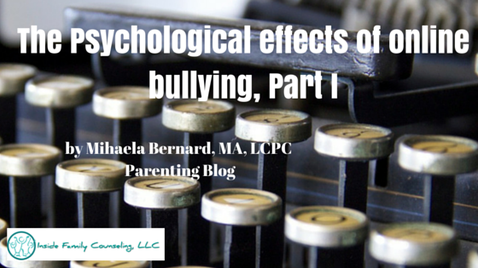
It’s easy to forget the emotional and psychological impact that being in school has for our children, especially for adolescents, but simply go back to the time when you were a student yourself and remember how hard it was to fit in socially, to keep up with homework and friendships, all while trying to find your own place in the world as a teenager.
This highly impressionable time doesn’t get any easier with the powerful effects social media and technology have on today’s adolescents.
October was National Bullying Prevention Awareness Month so I wanted to take a minute and dedicated a space to the issue of online bullying, how it affects our children and what we can do to prevent it.
Because it happens in the cyber space, online bullying may be hard to detect unless we have access to our children’s social media profiles. Even then, in today’s world of text messaging and snap chatting, it’s hard to monitor and be aware of everything that is being said online.
According to the PACER’s National Bullying Prevention Center, the following are some of the psychological effects of online bullying:
- Bullying directly affects a student’s ability to learn.
- Students who are bullied find it difficult to concentrate, show a decline in grades, and lose self-esteem, self- confidence, and self-worth.
- Students who are bullied report more physical symptoms, such as headaches or stomachaches, and mental health issues, such as depression and anxiety, than other students.
- In some cases, bullying has led to devastating consequences, such as school shootings and suicide.
- Students can be especially effective in bullying intervention. More than 55 percent of bullying situations will stop when a peer intervenes.
- Student education of how to address bullying for peers is critical, as is the support of adults.
What does this mean for parents and school staff? Talk to students about bullying and how to intervene when they see a kid being excluded, targeted or made fun of online. Volunteer and collaborate with school staff to increase awareness; create small experiential groups, where kids feel safe to share if they’ve been bullied and where they can role play ways to effectively intervene and stop it. Help them build a sense of safe, online community.
Is your teen someone, who has experienced online bullying? Share your story and what you did to help in the comment section below:



 RSS Feed
RSS Feed